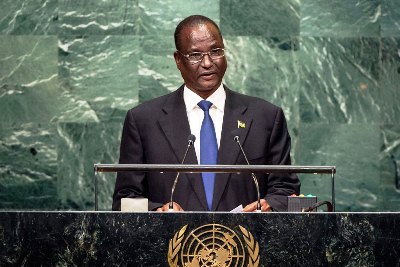S. Sudan VP says Juba supports UN-mandated peacekeeping force
September 24, 2016 (NEW YORK) – South Sudan’s First Vice President Taban Deng Gai on Friday said the world’s youngest nation consented to a Security Council resolution calling for the dispatch of the additional troops to Juba.

“This is in order to avoid derailing national healing and reconciliation. External intervention often affects negatively internal reconciliation,” he added.
The official’s remarks, however, appeared to have contradicted his earlier statement in which he appeared to have rejected the deployment of the force approved by the African Union during its extraordinary summit that was held in Kigali, Rwanda in July.
“We already have 13,000 UN troops in South Sudan who are sitting idle, not doing anything because there’s a problem with their mandate, and there’s also a problem with how they were selected,” Gai earlier told the Associated Press.
“I don’t think we need peacekeepers in South Sudan,” he stressed in a statement in line with President Salva Kiir’s initial rejection of the peace keepers.
The South Sudanese deputy president, while addressing the General Assembly, also accused his predecessor Riek Machar of allegedly instigating the July violent clashes in between the country’s rival forces in the capital, Juba.
Over 270 soldiers died in the incident, which a recent UN report solely blamed on President Kiir and the South Sudanese army chief of staff, Paul Malong Awan.
Gai, however, assured the General Assembly that South Sudan was now “stable, peaceful and that my government is functioning and life is returning back to normal”.
Tens of thousands of people have been killed and millions displaced in South Sudan’s worst violence since its cessation from Sudan in 2011. The UN, on several occasions, accused South Sudan’s warring forces of gross human rights violations.
LEADERS BLAMED
The UN Secretary General Ban Ki-moon Ban charged South Sudan leaders, including President Kiir with having “betrayed their people” by pursuing a violent path to power.
Last month, the Security Council approved the deployment of an additional 4,000-strong peacekeeping force in South Sudan, after renewed clashes in Juba between the country’s rival factions threatened to send the young nation back to all-out civil war.
Stressing that consensus should not be confused with unanimity, Ki Moon told the General Assembly: “The global public is right to ask whether this is how an organization in which we have invested so much hope and aspirations should function.”
The UN chief also called on the President of the General Assembly, to explore, with his successor, the establishment of a high-level panel to find practical solutions that will improve decision-making at the global organization.
He also urged all countries to cooperate with and work with the UN’s human rights arm; to not put obstacles in the path humanitarian workers; and not to ostracize or threaten UN envoys or and staff when they raise difficult issues.
“We must all be open and accountable to the people we serve,” said the UN chief.
(ST)
